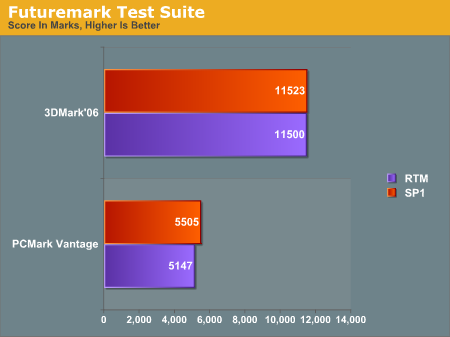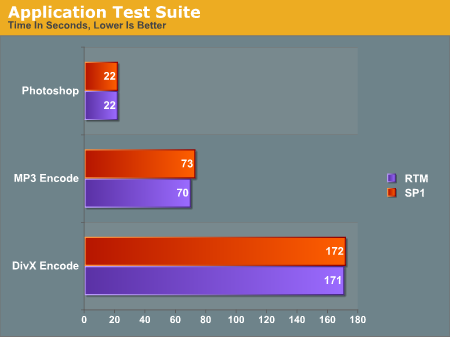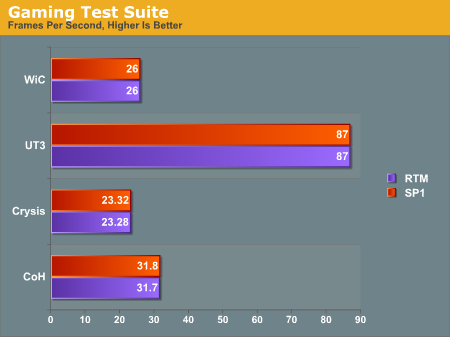Vista vs. Vista SP1
We’ll start with our Futuremark benchmark applications, 3DMark 2006 and PCMark Vantage. 3DMark in spite of being a graphics benchmark is sensitive enough to pick up on any changes in CPU or GPU performance (in this case any optimizations that reduce overhead), while PCMark Vantage is a full suite of benchmarks to measure overall system performance. It’s also one of the few benchmarks that we’re using that has a 64-bit mode.

Starting with 3DMark, the change in performance is effective imperceptible at 0.2%, well within experimental variance. This just goes to show there haven’t been any changes in overhead. PCMark however is far more interesting; here we get a full 7% score increase, indicating that SP1’s effects are felt outside of our earlier benchmarks. Drilling down ino PCMark’s subscores, we found that the higher score is a result of improvements in data compression scores, data encryption scores, and searching in Windows Mail, all of which can be attributed to improvements in file I/O performance. All other subscores are virtually unchanged.
Moving on to our application specific benchmarks, we have our DivX encoding test, our iTunes/LAME MP3 encoding test, and the Retouch Artists speed test for Photoshop. DivX stresses I/O somewhat, while the rest of the tests are largely memory and CPU-bound.

Here we see no notable changes in performance moving to SP1. All of the application tests come back with virtually identical scores.
Finally we have our gaming tests. Games tend to be good
a great way to stress all the components in a system, so this should give us a better idea
of how far improvements in Vista’s file I/O system stretch. For our games we have the RTSes World in Conflict and Company of Heroes, and the FPSes Crysis and Unreal Tournament 3.

In spite of the more rounded nature of gaming tests compared to our application tests, the results are the same with no perceivable improvement in performance. At this point it’s clear that what performance improvements Vista does offer are limited to a handful of situations where we are specifically file or network I/O bound. What this means for any given application is that it is unlikely to see a performance improvement due to SP1.
We also ran some quick testing with startup and shutdown times to see if Vista improved performance there at all; there were a couple of hotfixes in SP1 that dealt with these matters.
| Vista Startup/Shutdown Performance | ||
| |
Pre-SP1
|
Post-SP1
|
| Startup Time |
33 Seconds
|
28 Seconds
|
| Shtudown Time |
32 Seconds
|
31 Seconds
|
| . | ||
While shutdown time doesn’t see any real performance improvements, we are surprised to see an improvement in startup time by several seconds. Vista is not notably slow to start up in the first place, so we weren’t expecting much improvement if there was to be any at all. Shaving off 5 seconds for a 14% improvement in startup time (getting startup below 30 seconds altogether) is a pleasant surprise.










62 Comments
View All Comments
whatthehey - Wednesday, February 27, 2008 - link
The only thing they can do is nitpick about the use of a term like x64, when everybody knows what it means and Microsoft uses it all over the place (i.e. "Update for Windows Vista for x64-based Systems").You, sir, add new meaning to the term anal retentive.
"The sky is falling - someone said x64 instead of http://en.wikipedia.org/wiki/X64">x86-64! Help!"
PrinceGaz - Wednesday, February 27, 2008 - link
They probably use the term x64 because Microsoft used it for the 64-bit x86 version of XP - "Windows XP Professional x64 Edition", to differentiate it from the old 64-bit Itanium version - "Windows XP 64-bit Edition".Everyone knows what x64 means (everyone who actually needs to know, anyway), so it makes sense to use it as it is quicker and easier than alternatives like x86-64 or 64-bit x86.
Martimus - Wednesday, February 27, 2008 - link
Is exFAT an open standard? It sounds like a promising File Management system for a non-Microsoft OS.mmjjzz - Wednesday, February 27, 2008 - link
READ, interest problem found!!client: Intel Q6600, 4GB RAM, Vista 64bit
server: Intel Celeron 2.53, 2 GB RAM, Windows 2003 SP1
Gigabit network (Jumbo Frames Enabled, SP1 didn't improve anything without jumbo frames enabled)
Pre SP1 (large file)
-------
client (non OS drive) -> Server (share 1) = 43MB/s
Server (share1) -> client = 6MB/s
Post SP1 (large file)
-------
client (non OS drive) -> Server (share 1) = 45MB/s
Server (share1) -> client = 33MB/s
on client, Copying from Share1 to Share2 on server = 900K/s
Share to share TAKES FOREVER.. i never tested this pre SP1, but i am assuming it is the same
gimper48 - Wednesday, February 27, 2008 - link
I may have missed this in the article. However, some people see it in update some do not. I have vista 64 and it has never come up as an option. Anyone know the methodology to determine who gets it and who does not? Also is the it sp1 only available to technet subscriptions? That kinda screws the small systems admin at a small company. They cannot upgrade all in one shot then.DigitalFreak - Wednesday, February 27, 2008 - link
No-one is supposed to be getting it via Windows Update yet (except maybe some Beta testers). The fact that it was up there briefly the other day was a mistake on Microsoft's part. It should start showing up some time in March.haplo602 - Wednesday, February 27, 2008 - link
While you mentioned UEFI, it would be an interesting separate article/guide. With technology description ad current state of affairs.Are you planning any such article ?
TheJian - Wednesday, February 27, 2008 - link
I'm wondering about the comment made regarding XP64 being bad for consumers. Why? Myself I'd like to see XP64 vs. Vista64 benchmarks done (games and all). Is there something stopping you from benchmarking XP64? It's been 2.5 years since this article at Tom's:http://www.tomshardware.com/2005/08/23/windows_xp_...">http://www.tomshardware.com/2005/08/23/windows_xp_...
XP64 looked pretty good then, 2.5yrs later it should SURELY be better correct? Why no testing for XP64? Most of Tom's benchmarks show a dead heat for xp32 vs xp64. On Steampowered.com Vista 64bit only counts for 2.5% of their users and Vista total is only 16.5%. Shouldn't you have a go at 64bit XP? Unfortunately they didn't breakdown the XP32 vs XP64 numbers.
Ryan Smith - Wednesday, February 27, 2008 - link
The issue with XP64 is that it is effectively an orphaned operating system on the consumer side of things. It was never even intended for consumer use, it was a slightly retooled version of Server 2003 designed to fill a gap for workstations that needed a 64bit version of Windows. Very few companies in the consumer space are testing their wares against XP64, this goes for both hardware and software. Compatibility problems are still few and far between, but never the less going forward it's only going to get worse particularly when it comes to drivers.TheJian - Thursday, February 28, 2008 - link
Are you sure? Nvidia's latest WHQL driver is dated Dec2007 with these notes:# WHQL driver for GeForce FX, 6, 7, and 8 series GPUs.
# Added support for GeForce 8800 GTS 512 GPU.
# Recommended driver for the latest DirectX 9, and OpenGL applications.
# Numerous game and application compatibility fixes. Please refer to the release documentation for more information on features, driver fixes, and known issues.
They are still improving gaming with these! I don't see it as Orphaned when people are revolting against Vista. Read the fixes in the readme. There are quite a few issues fixed in 64bit. Don't forget people were buying this OS for years before Vista. Both Intel and AMD were selling 64bit chips before vista for years. People were running XP64bit and still are (if they wanted to use their chip's abilities that is). Is it so tough to throw up some benchmarks for xp64? Is MS telling you not to do it in some agreement like stopping XP SP3 benchmarks from being published in their EULA? Just checked ATI/AMD and their drivers are updated for 64bit FEB 13th! That's just 2 weeks ago and includes the 3870x2 boards.
If movement in this area picked up (cough up the benchies!) I could see MS backing away from Vista and just re-releasing XP with DX10.1 and Aero Glass which would make Vista pointless. Vista could end up just like WinME. We ended up with Win2k, and for games that wouldn't run in that OS we dual booted to 98-OSR2 :) LOL I see drivers for my chipsets on Intel P35 and Nvidia boards also. I don't see waning support. Same date for Nvidia's xp32/64 drivers so they are developed together (the readme covers both also). It seems to me only Microsoft wants it orphaned. Crappy benchmarks would prove it (or not if they're great!) so lets see some please.